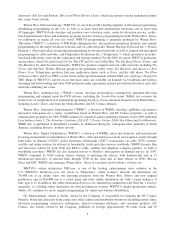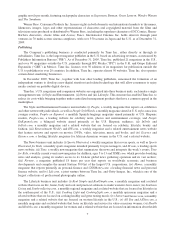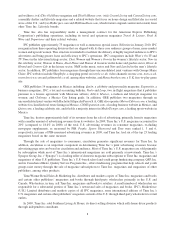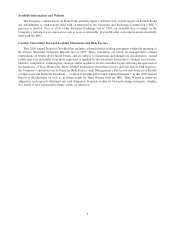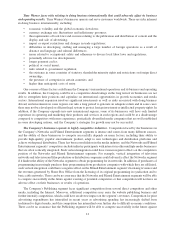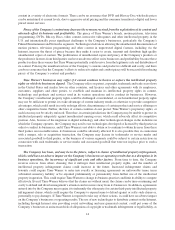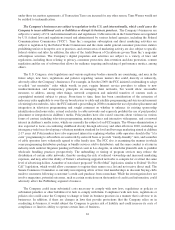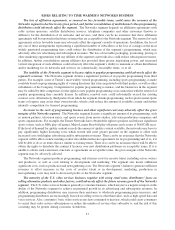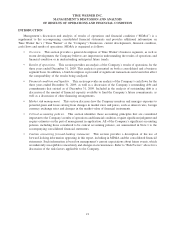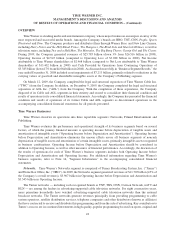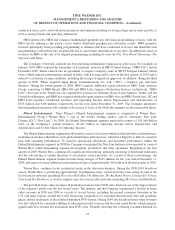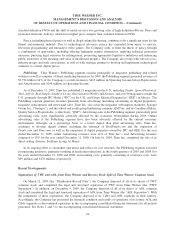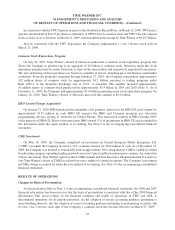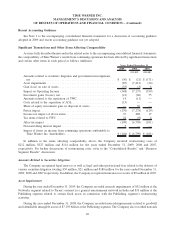Time Magazine 2009 Annual Report Download - page 28
Download and view the complete annual report
Please find page 28 of the 2009 Time Magazine annual report below. You can navigate through the pages in the report by either clicking on the pages listed below, or by using the keyword search tool below to find specific information within the annual report.under these tax matters agreements, if Transaction Taxes are incurred for any other reason, Time Warner would not
be entitled to indemnification.
The Company’s businesses are subject to regulation in the U.S. and internationally, which could cause the
Company to incur additional costs or liabilities or disrupt its business practices. The Company’s businesses are
subject to a variety of U.S. and international laws and regulations. Cable networks in the United States are regulated
by U.S. federal laws and regulations issued and administered by various federal agencies, including the Federal
Communications Commission (“FCC”). Time Inc.’s magazine subscription and direct marketing activities are
subject to regulation by the Federal Trade Commission and the states under general consumer protection statutes
prohibiting unfair or deceptive acts or practices, and certain areas of marketing activity are also subject to specific
federal statutes and rules. In addition, the rules of the Audit Bureau of Circulations govern Time Inc.’s magazine
subscription activities. The Company’s digital properties and activities are subject to a variety of laws and
regulations, including those relating to privacy, consumer protection, data retention and data protection, content
regulation and the use of software that allows for audience targeting and tracking of performance metrics, among
others.
The U.S. Congress, state legislatures and various regulatory bodies currently are considering, and may in the
future adopt, new laws, regulations and policies regarding various matters that could, directly or indirectly,
adversely affect the Company’s businesses. For example, in October 2009, the FCC initiated a rulemaking to adopt
so-called “net neutrality” rules which would, in part, require Internet service providers to adhere to new
nondiscrimination and transparency principles in managing their networks, but would allow reasonable
measures to address, among other things, network congestion and unlawful transfers of content, such as
copyrighted material subject to piracy. From time to time, there has been consideration of the extension of
indecency rules applicable to over-the-air broadcasters to cable and satellite programming and stricter enforcement
of existing laws and rules. Also, the FCC initiated a proceeding in 2008 to examine the use of product placement and
integration in television programming and sought comment on whether to enhance its existing sponsorship
identification disclosure rules, extend such rules to cable networks and expressly prohibit the use of paid product
placement or integration in children’s media. Policymakers have also raised concerns about violence in various
forms of content, including television programming, motion pictures and interactive videogames, and a renewed
interest in children’s media issues, which are currently the subject of an FCC inquiry. The Obama administration is
also expected to focus on combating childhood obesity through advocacy and other efforts in 2010, including an
interagency task force developing a voluntary nutrition standard for food and beverage marketing aimed at children
2-17 years old. Policymakers have also expressed interest in exploring whether cable operators should offer “à la
carte” programming to subscribers on a network-by-network basis or provide “family-friendly” tiers, and a number
of cable operators have voluntarily agreed to offer family tiers. The FCC also is examining the manner in which
some programming distributors package or bundle services sold to distributors, and the same conduct is at issue in
industry-wide antitrust litigation pending in Federal court in Los Angeles, in which the plaintiffs seek to prohibit
wholesale bundling practices prospectively. The unbundling or tiering of program services may reduce the
distribution of certain cable networks, thereby creating the risk of reduced viewership and increased marketing
expenses, and may affect the ability of Turner’s advertising-supported networks to compete for or attract the same
level of advertising dollars. A number of states have proposed “Do Not Mail” legislation, similar to Federal “Do Not
Call” legislation, which would allow consumers to register their names on a list and not receive direct mail. The
Senate Commerce Committee is currently investigating offers of free trial memberships in discount buying clubs
made to customers following a customer’s credit card purchase from a merchant. While the investigation does not
involve magazines, potential outcomes, such as certain restrictions on the transfer of credit card information, could
adversely affect the Publishing segment’s business.
The Company could incur substantial costs necessary to comply with new laws, regulations or policies or
substantial penalties or other liabilities if it fails to comply with them. Compliance with new laws, regulations or
policies also could cause the Company to change or limit its business practices in a manner that is adverse to its
businesses. In addition, if there are changes in laws that provide protections that the Company relies on in
conducting its business, it would subject the Company to greater risk of liability and could increase its costs of
compliance or limit its ability to operate certain lines of business.
16


